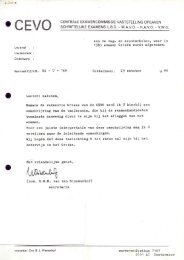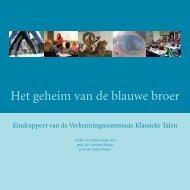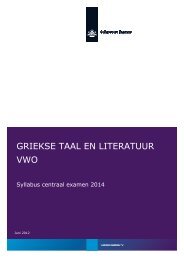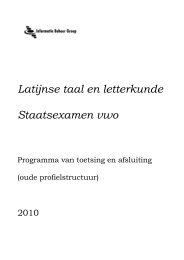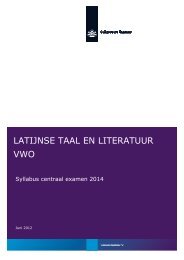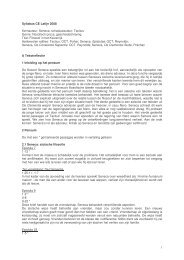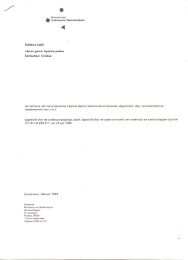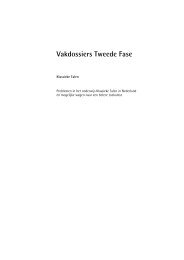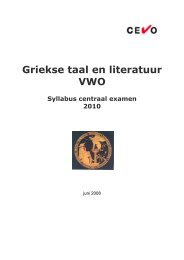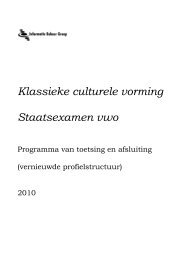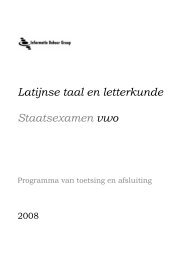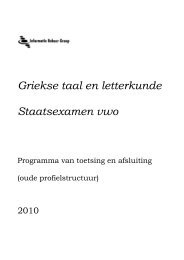Rome Wasn't Digitized in a Day - Council on Library and Information ...
Rome Wasn't Digitized in a Day - Council on Library and Information ...
Rome Wasn't Digitized in a Day - Council on Library and Information ...
Create successful ePaper yourself
Turn your PDF publications into a flip-book with our unique Google optimized e-Paper software.
120<br />
simplicity, <strong>and</strong> sensible file nam<str<strong>on</strong>g>in</str<strong>on</strong>g>g. As Dutschke expla<str<strong>on</strong>g>in</str<strong>on</strong>g>ed, “There is an unfortunate tendency to want<br />
to make the file name carry verbal mean<str<strong>on</strong>g>in</str<strong>on</strong>g>g, to allow humans to underst<strong>and</strong> how it refers to the reallife<br />
object” (Dutschke 2008). She argued that this was unnecessary; because the catalog<str<strong>on</strong>g>in</str<strong>on</strong>g>g for files<br />
occurs elsewhere <str<strong>on</strong>g>in</str<strong>on</strong>g> tables of the database, such <str<strong>on</strong>g>in</str<strong>on</strong>g>formati<strong>on</strong> need not be encoded <str<strong>on</strong>g>in</str<strong>on</strong>g> the file name.<br />
Simple <strong>and</strong> transparent file names, she <str<strong>on</strong>g>in</str<strong>on</strong>g>sisted, helped limit future costs of hav<str<strong>on</strong>g>in</str<strong>on</strong>g>g to update <str<strong>on</strong>g>in</str<strong>on</strong>g>valid<br />
semantic values or fix<str<strong>on</strong>g>in</str<strong>on</strong>g>g typ<str<strong>on</strong>g>in</str<strong>on</strong>g>g errors.<br />
While the database used for data entry <strong>and</strong> collecti<strong>on</strong> is currently Microsoft Access, Dutschke po<str<strong>on</strong>g>in</str<strong>on</strong>g>ted<br />
out that <strong>on</strong> a regular basis every DS partner exports its own, collecti<strong>on</strong>- specific <str<strong>on</strong>g>in</str<strong>on</strong>g>formati<strong>on</strong> <str<strong>on</strong>g>in</str<strong>on</strong>g>to XML<br />
<strong>and</strong> then forwards those XML data to the central DS organizati<strong>on</strong>. “It is <strong>on</strong> the XML-encoded data that<br />
technology experts write the applicati<strong>on</strong>s that make the data useful to scholars,” Dutschke reported,<br />
“via mesh<str<strong>on</strong>g>in</str<strong>on</strong>g>g the data from multiple partners, search<str<strong>on</strong>g>in</str<strong>on</strong>g>g it, retriev<str<strong>on</strong>g>in</str<strong>on</strong>g>g it, display<str<strong>on</strong>g>in</str<strong>on</strong>g>g it.” In additi<strong>on</strong>,<br />
because XML is both n<strong>on</strong>proprietary <strong>and</strong> platform <str<strong>on</strong>g>in</str<strong>on</strong>g>dependent they have chosen to use it for “data<br />
transport, l<strong>on</strong>g-term storage <strong>and</strong> manipulati<strong>on</strong>.” Cayless et al. (2009) have also argued for the use of<br />
XML as a l<strong>on</strong>g-term preservati<strong>on</strong> format for digitally encoded epigraphic data. Two other l<strong>on</strong>g-term<br />
preservati<strong>on</strong> challenges that were identified by Dutschke were the challenges of mass storage <strong>and</strong> the<br />
security of the files.<br />
While technical <str<strong>on</strong>g>in</str<strong>on</strong>g>teroperability <strong>and</strong> f<str<strong>on</strong>g>in</str<strong>on</strong>g>ancial susta<str<strong>on</strong>g>in</str<strong>on</strong>g>ability were two key comp<strong>on</strong>ents of the l<strong>on</strong>g-term<br />
preservati<strong>on</strong> of any digital project, Dutschke ultimately c<strong>on</strong>cluded that the most important questi<strong>on</strong>s<br />
were political; <str<strong>on</strong>g>in</str<strong>on</strong>g> other words, were the DS partners committed to its l<strong>on</strong>g-term survival, <strong>and</strong> did the<br />
larger user community value it To stabilize the DS c<strong>on</strong>sortium, the DS has created a govern<str<strong>on</strong>g>in</str<strong>on</strong>g>g body<br />
that has developed policies for the daily management of decisi<strong>on</strong> mak<str<strong>on</strong>g>in</str<strong>on</strong>g>g. They also c<strong>on</strong>ducted a user<br />
survey to which 200 people resp<strong>on</strong>ded <strong>and</strong> 43 of which agreed to be <str<strong>on</strong>g>in</str<strong>on</strong>g>terviewed <str<strong>on</strong>g>in</str<strong>on</strong>g> detail; the major<br />
c<strong>on</strong>clusi<strong>on</strong> of this survey was the unrelent<str<strong>on</strong>g>in</str<strong>on</strong>g>g dem<strong>and</strong> for more c<strong>on</strong>tent. This led Dutschke to offer the<br />
important <str<strong>on</strong>g>in</str<strong>on</strong>g>sight that digital projects need to underst<strong>and</strong> both their current <strong>and</strong> future user dem<strong>and</strong>s,<br />
ultimately posit<str<strong>on</strong>g>in</str<strong>on</strong>g>g that “the will to susta<str<strong>on</strong>g>in</str<strong>on</strong>g>ability lies not <strong>on</strong>ly with<str<strong>on</strong>g>in</str<strong>on</strong>g> the project <strong>and</strong> its<br />
creators/partners; it also lies with its users.”<br />
One last critical issue raised by Dutschke addressed the needs of the DS <strong>and</strong> the digital humanities as a<br />
whole to develop a greater underst<strong>and</strong><str<strong>on</strong>g>in</str<strong>on</strong>g>g of the costs <strong>and</strong> needs of cyber<str<strong>on</strong>g>in</str<strong>on</strong>g>frastructure:<br />
It’s not simply that digital projects cost m<strong>on</strong>ey; all human endeavour falls <str<strong>on</strong>g>in</str<strong>on</strong>g>to that category.<br />
It's that digital projects rema<str<strong>on</strong>g>in</str<strong>on</strong>g> so new to us that we, as a nati<strong>on</strong> <strong>and</strong> even as a world-wide<br />
community of scholars work<str<strong>on</strong>g>in</str<strong>on</strong>g>g <str<strong>on</strong>g>in</str<strong>on</strong>g> the humanities, haven't fully understood the costs nor<br />
factored them out across appropriate bodies. The steps DS has taken towards a more reliable ad<br />
efficient technology, <strong>and</strong> the steps it has not taken reflect growth <strong>and</strong> uncerta<str<strong>on</strong>g>in</str<strong>on</strong>g>ty <str<strong>on</strong>g>in</str<strong>on</strong>g> the field<br />
overall. DS <strong>and</strong> the digital world as a community still lack a cyber<str<strong>on</strong>g>in</str<strong>on</strong>g>frastructure not simply <str<strong>on</strong>g>in</str<strong>on</strong>g><br />
terms of hardware or software, but even more importantly as a shared <strong>and</strong> recognized expertise<br />
<strong>and</strong> mode of operati<strong>on</strong> (Dutschke 2008).<br />
Throughout this review, the uncerta<str<strong>on</strong>g>in</str<strong>on</strong>g>ty regard<str<strong>on</strong>g>in</str<strong>on</strong>g>g the way forward for a digital <str<strong>on</strong>g>in</str<strong>on</strong>g>frastructure at both<br />
the <str<strong>on</strong>g>in</str<strong>on</strong>g>dividual <strong>and</strong> the cross-discipl<str<strong>on</strong>g>in</str<strong>on</strong>g>ary levels was frequently discussed. While technological issues<br />
<strong>and</strong> f<str<strong>on</strong>g>in</str<strong>on</strong>g>ancial c<strong>on</strong>cerns were often raised, Dutschke also broached the important questi<strong>on</strong> of the lack of<br />
shared expertise <strong>and</strong> bus<str<strong>on</strong>g>in</str<strong>on</strong>g>ess models <str<strong>on</strong>g>in</str<strong>on</strong>g> terms of underst<strong>and</strong><str<strong>on</strong>g>in</str<strong>on</strong>g>g how best to move forward toward<br />
build<str<strong>on</strong>g>in</str<strong>on</strong>g>g a humanities cyber<str<strong>on</strong>g>in</str<strong>on</strong>g>frastructure.<br />
The sec<strong>on</strong>d major virtual library of manuscripts is the Manuscriptorium, which, accord<str<strong>on</strong>g>in</str<strong>on</strong>g>g to its<br />
website, is seek<str<strong>on</strong>g>in</str<strong>on</strong>g>g to create “a virtual research envir<strong>on</strong>ment provid<str<strong>on</strong>g>in</str<strong>on</strong>g>g access to all exist<str<strong>on</strong>g>in</str<strong>on</strong>g>g digital



